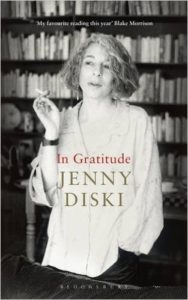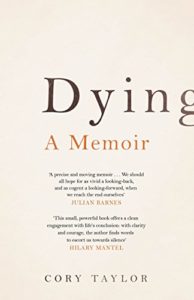On “Dying” and “In Gratitude”
![]()
 I’m writing a memoir, a form that in my mind plays hide-and-seek with the truth. It contains what I imagine and what I remember being told. Absolute veracity is what I am after.
I’m writing a memoir, a form that in my mind plays hide-and-seek with the truth. It contains what I imagine and what I remember being told. Absolute veracity is what I am after.
Jenni Diski In Gratitude
Two women writers, Jenni Diski and Cory Taylor, are diagnosed with cancer and its inoperable. Trying to come to terms with the doctor’s grim prognosis is not easy. Suddenly time takes on a different meaning. Jenni Diski began a column for the London Review of Books once her cancer was diagnosed. It was a series a essays that were published reflecting on her life, her birth family, her writing, her school and most significantly her complicated relationship with the Nobel Prize winner, Doris Lessing, who took fifteen-year-old Jennifer Simmonds under her wing. The Australian writer Cory Taylor too spends a while in her memoir, Dying, remembering her mother and the choices she made. In both the memoirs what comes across clearly is that the two dying writers are reflecting upon their past but are also hugely influenced by and acknowledge the presence of the women who made the writers what they are. Jenni Diski had always nursed a desire to be a writer but had not been very focused about it till she met Doris Lessing and was introduced to her world of writers and other creative minds who always made interesting conversation and had ideas to offer. Cory Taylor discovered that her mother had had a dream to be a writer but never achieved it. She writes in Dying : “Writing, even if most of the time you are only doing it in your head, shapes the world, and makes it bearable. …I’m never happier than when I’m writing, or thinking about writing, or watching the world as a writer, and it has been this way from the start.” Three Australian writers including Benjamin Law wrote a beautiful obituary for Cory Taylor in the Guardian terming Dying as a “remarkable gift” for providing a vocabulary and invitation to speak about that “unmentionable thing”, a “monstrous silence” — death. ( 6 July 2016, http://bit.ly/2dPq0Mx ) These sentiments on writing and the gift of the memoir can probably be extended to Jenni Diski and In Gratitude too.
Apart from Jenni Diski’s and Cory Taylor’s preoccupation with writing and their evolution as writers what comes  through strongly in both memoirs is the tussle between secular and religious modes of coping with death and its rituals. Also how ill-prepared a secular upbringing makes an individual in understanding burial rites or managing one’s grief once a loved one departs. How does one mourn? The structures of religious rituals seem to take care of the moments of sorrow. There is much to do. Yet the challenge of speaking of death and the process of dying is not easy. Cory Taylor had even contemplated euthanasia and ultimately passed away in hospice care.
through strongly in both memoirs is the tussle between secular and religious modes of coping with death and its rituals. Also how ill-prepared a secular upbringing makes an individual in understanding burial rites or managing one’s grief once a loved one departs. How does one mourn? The structures of religious rituals seem to take care of the moments of sorrow. There is much to do. Yet the challenge of speaking of death and the process of dying is not easy. Cory Taylor had even contemplated euthanasia and ultimately passed away in hospice care.
In Gratitude and Dying: A memoir put the spotlight on the magnificent leaps medicine and technology have made, in many cases it has prolonged life but with it is the baggage of ethics — whether it is possible to go through the agony of pain while dying a slow death or to end it all swiftly by assisted suicide or euthanasia. These are critical issues not necessarily the focus areas of both books although Cory Taylor confesses in having contemplated euthanasia. While reading the memoirs innumerable questions inevitably arise in a reader’s mind.
Some of the literature published recently has been seminal in contributing to the growing awareness and need to discuss death increasingly in modern times when advancement in medical technology seems to prolong human suffering. Also in an increasingly polarised world between the secular and religious domains bring to the fore the disturbed confusion that reigns in every individual on how to deal with the dying, the finality of death, disposal of the mortal remains and the despair it leaves the distraught survivors in. Some links are:
- “Daughters of Australian scientists who took their own lives reflect on their parents’ plan” http://bit.ly/2dDfvc8 ( Jan 2016)
- Amitava Kumar’s essay “Pyre” published in Granta ( https://granta.com/pyre/ ) and recently republished in Best American Essays 2016, edited by Jonathan Franzen.
- Atul Gawande’s Being Mortal ( 2015)
- Paul Kalanithi’s When Breath Becomes Air ( 2016)
- Aleksander Hemon’s moving essay on his infant daughter’s brain cancer ( “The Aquarium: A Child’s Isolating Illness” JUNE 13 & 20, 2011 ISSUE http://www.newyorker.com/magazine/2011/06/13/the-aquarium )
- Randy Pausch’s The Last Lecture ( 2008, https://www.youtube.com/watch?v=ji5_MqicxSo )
- Andrew Solomon’s essay on his mother’s decision to opt for euthanasia ( “A Death of One’s Own” 22 May 1995 http://www.newyorker.com/magazine/1995/05/22/a-death-of-ones-own )
In Gratitude and Dying are strangely comforting while being thought provoking in raising uncomfortable questions about mortality, importance of time, maintenance of familial ties and doing that which pleases or gives the individual peace. Both the memoirs have a confident writing style as if by capturing memories in words the writers are involved a therapeutic process of facing their mortality while the urgency to their writing has an unmistakable strength to its tenor as if no one will have the time to dispute their published words.
Read these books.
Jenni Diski In Gratitude Bloomsbury, London, 2016. Pb. pp. 250 £12.99
Cory Taylor Dying: A Memoir Canongate, London, 2016. Pb. pp. £12.99
24 Oct 2016
